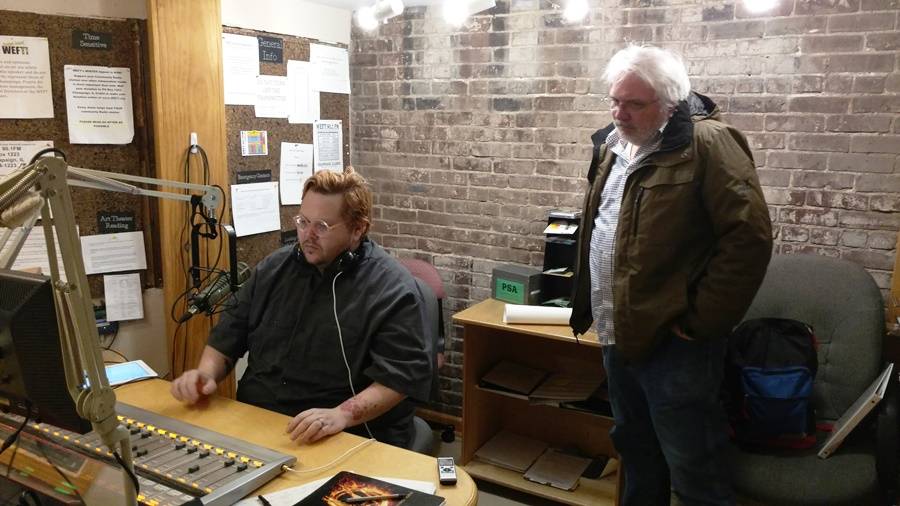The 100 block of North Market Street is tucked just away from the brighter lights and bustling activity of downtown Champaign. Not surprisingly, this portion of Market Street is desolate on a cold January night at 11:45. Yet warm-sounding music is being released into the world via community radio station WEFT, 90.1 FM, which is located on North Market Street and has been operational since 1981.
Just minutes before his shift, forty-one-year-old WEFT DJ and Champaign resident Baub Alred waits in the station’s Great Hall area, where live bands play every Monday night and thousands of CDs are stacked tall on shelves that reach the ceiling. A hefty guy who stands almost six feet tall, Alred has a cherub face with a light beard adorning it. He sports round pinkish glasses and has a full head of orange-blonde hair that’s reminiscent of Scott Weiland’s look during the Stone Temple Pilots’ Purple era.
Hailing from Springfield, Missouri, Alred is a horror-movie enthusiast who works as an office support associate in the College of Engineering at the University of Illinois. His parents divorced when he was a year old but stayed together afterward for several more years. From a young age Alred watched his father behave abusively toward his mother. Eventually Alred, his sister, and their mother escaped the mistreatment when his mom’s sisters arrived from Kentucky in the middle of the night to take them away—minus the family’s patriarch.
The trio decided to stay in Henderson, near the Indiana border, and Alred lived in Kentucky until he was fifteen. He resided in a trailer park among many types of people and loved it. Alred’s family allowed him to be himself, and he did so at will, carousing with his many female cousins and hanging out with older kids who spent time near the laundromat. At this stage of his life, the future WEFT DJ sought out trouble where he could find it.
“It was actually a really great environment,” says Alred, who as a child and teen spoke his mind and never backed down from a fight.
Alred’s family later moved to Roodhouse, Illinois, when he was fifteen. All at once he found himself in a rural, more stifling locale. As an adult, Alred describes himself as “pissed-off happy,” at peace with who he is and still evolving. But as a kid he could get depressed, angry, and argumentative with those in authority.
Being gay didn’t make his life any easier, but he dealt with it.
“People would obviously make fun of me, but I really didn’t care. So people just stopped making fun of me,” he says.
It wasn’t a big deal when Alred made his sexuality public in his early twenties. Those in the various circles of his life already knew he was gay, or “artsy” as some labeled him. He has been with his current partner, Barry, for more than ten years and has always felt blessed his family didn’t spurn him for being gay.
Not long after Alred’s on-air show begins, fellow WEFT volunteer Todd Hunter pops his head into the studio.
“You may want to know,” he tells Alred, “Todd [Durnil] seems to have figured out that it looks like nothing has recorded since 11 this morning.”
“Okay.”
“So if you’re planning on, like, an awesome show, you might want to record it some other way.”
“Okay, yeah. I’ll do that.”
Hunter relates to Alred the day’s many tensions via email among station volunteers, which may have led to no one noticing that WEFT shows weren’t getting streamed on Radio Free America like usual. Alred takes the news in stride, knowing he is a relative newbie at WEFT, and that he can post songs from tonight’s show on his online Mixcloud page. Still, he’s a little put off by the news: “I do get a lot of listens on Radio Free America, so it’s kind of a bummer.”

Alred with fellow WEFT DJ Todd Durnil.
As the rock director at the station, Alred has an ocean of music at his disposal. He loves all-female punk music and plays loads of it on the radio, along with female alternative and goth. His music is off the beaten path and ranges from the 1970s onward.
Alred’s “From Heartbreak to Hate” show is named after the first ditty he ever played on the program, a tune by the Scottish band Angelfish, which was fronted by lead singer Shirley Manson, who later went on to sing in the more popular indie band Garbage.
The bands Alred gives exposure to on WEFT are angry and anti-authority. In his eyes they are musical ambassadors who scream, rant, and warble for the causes he cares deeply about: domestic abuse and women’s rights.
“I just have always kind of felt like female music was a little bit more … outside than male-dominated music. The basis of a lot of these songs are the same things we have going on now where they don’t have equal rights still. So that affects me as well. That’s kind of why I relate to it,” he says.
Alred’s art hobby is inspired by the music he listens to and vice versa. After years of comic book-style sketching he has delved into female-based digital art, which he labels “pop surrealism.” His online images are razor sharp, colorful, and evocative, women at the center of scenes that range from dream-like fairy tales to the depths of hell.

The Death of Aqualad, by Baub Alred.
Despite his talk of rebelliousness and disestablishment, Alred is a super-nice person who goes out of his way to act kind toward strangers. His on-air persona is straightforward and unspectacular, but he gets the job done with no wasteful banter and by playing music for a cause, music that has meant something to him for a long time.
The tech-savvy DJ is not religious, but he’s taught Sunday school in the past and recognizes the value that religion plays in the lives of his friends and family. He’s got all sorts of diverse friends whom he respects for their multiplicity and various interests.
“I have very religious friends. And I have very anti-religion friends. And if I had a party, they would have to get along at my party,” he says.
It was anything but a party in Alred’s view the day after Donald Trump won the presidency. He says he went through “five sets of emotions” the night of the election, but the next day he woke up with a focused attitude, asking himself how society could improve and then taking the lead to comfort the crying and broken colleagues in his office.
With his Midwestern roots and Kentucky upbringing, Alred recognizes that Trump appealed to a middle-class majority whom his Democratic opponent may have ignored at times, or taken for granted.
“Until a person can get every single disenfranchised group of people together, you’re going to have polarizing politics,” he says, admitting that such a development likely won’t happen in his lifetime.
Still, he’s trying to reach for such lofty goals, one song at a time.
Check out The Art of Baub Alred Facebook page and listen to the tunes played on Alred’s Friday the 13th show (fitting for this lover of the macabre) covered in this article.








